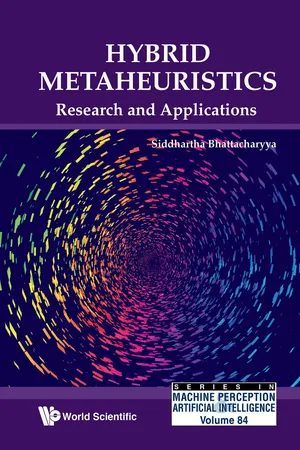
- 312 pages
- English
- ePUB (mobile friendly)
- Available on iOS & Android
About this book
A metaheuristic is a higher-level procedure designed to select a partial search algorithm that may lead to a good solution to an optimization problem, especially with incomplete or imperfect information.
This unique compendium focuses on the insights of hybrid metaheuristics. It illustrates the recent researches on evolving novel hybrid metaheuristic algorithms, and prominently highlights its diverse application areas. As such, the book helps readers to grasp the essentials of hybrid metaheuristics and to address real world problems.
The must-have volume serves as an inspiring read for professionals, researchers, academics and graduate students in the fields of artificial intelligence, robotics and machine learning.
Contents:
- Preface
- Introduction to Hybrid Metaheuristics (Sandip Dey, Sourav De and Siddhartha Bhattacharyya)
- Research:
- Hybrid TLBO-GSA Strategy for Constrained and Unconstrained Engineering Optimization Functions (Alok Kumar Shukla, Pradeep Singh and Manu Vardhan)
- Review on Hybrid Metaheuristic Approaches for Optimization in Multibiometric Authentication System (Aarohi Vora, Chirag Paunwala and Mita Paunwala)
- A Novel Membrane Computing Inspired Jaya Algorithm Based Automatic Generation Control of Multi-area Interconnected Power System (Tapan Prakash and Vinay Pratap Singh)
- Applications:
- Edge Detection in Underwater Image Based on Human Psycho Visual Phenomenon and Mean Particle Swam Optimization (MeanPSO) (Hiranmoy Roy and Soumyadip Dhar)
- Quantum Inspired Non-dominated Sorting Based Multi-objective GA for Multi-level Image Thresholding (Sandip Dey, Siddhartha Bhattacharyya and Ujjwal Maulik)
- An Optimized Support Vector Regression Using Whale Optimization for Long Term Wind Speed Forecasting (Sarah Osama, Essam H Houssein, Ashraf Darwish, Aboul Ella Hassanien and Aly A Fahmy)
- A Hybrid Grey Wolf Optimization and Support Vector Machines for Detection of Epileptic Seizure (Asmaa Hamad, Essam H Houssein, Aboul Ella Hassanien, Aly A Fahmy and Siddhartha Bhattacharyya)
- Optimization of Recurrent Neural Networks Using Evolutionary Group-based Particle Swarm Optimization for Hexapod Robot Gait Generation (Chia-Feng Juang, Yu-Cheng Chang and I-Fang Chung)
- Load Optimization using Hybrid Metaheuristics in Power Generation with Transmission Loss (Dipankar Santra, Krishna Sarker, Anirban Mukherjee and Subrata Mondal)
- Conclusion (Siddhartha Bhattacharyya)
Readership: Professionals, researchers, academics, and graduate students in artificial intelligence, robotics and machine learning.
Frequently asked questions
- Essential is ideal for learners and professionals who enjoy exploring a wide range of subjects. Access the Essential Library with 800,000+ trusted titles and best-sellers across business, personal growth, and the humanities. Includes unlimited reading time and Standard Read Aloud voice.
- Complete: Perfect for advanced learners and researchers needing full, unrestricted access. Unlock 1.4M+ books across hundreds of subjects, including academic and specialized titles. The Complete Plan also includes advanced features like Premium Read Aloud and Research Assistant.
Please note we cannot support devices running on iOS 13 and Android 7 or earlier. Learn more about using the app.
Information
Chapter 1
Introduction to Hybrid Metaheuristics
[email protected]
[email protected]
[email protected]
1. Introduction
Table of contents
- Cover page
- Title page
- Copyright
- Dedication
- Preface
- Contents
- Chapter 1. Introduction to Hybrid Metaheuristics
- Part I: Research
- Part II: Applications
- Index